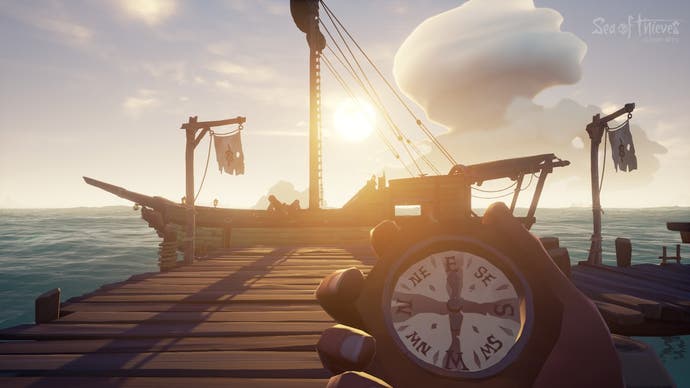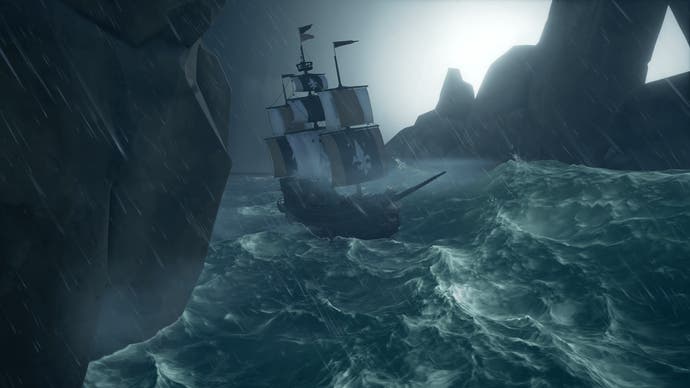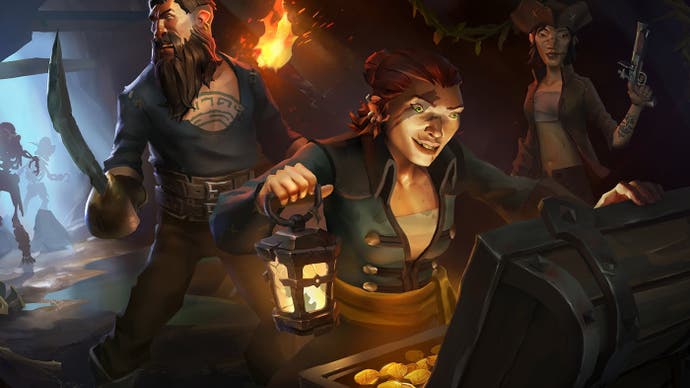Sea of Thieves is sandbox gaming at its purest
Come on in, the water's lovely!
Sea of Thieves has just gone live on the Microsoft Store for Xbox One and PC, and we're setting to the high seas to bring you our review as soon as we've had plenty of time with final code on fully stressed servers. Before then, though, here's some early impressions from time with the various betas and a small while with final code.
Do you think we can take them? I whisper to my friend as a the shadow of a galleon passes across the starlit horizon. It's night, obviously, and we're in a relatively feeble two-man sloop, far outmatched in terms of raw fire powder by our sudden pursuers. Yet a storm is closing in, the sea is getting rough, and the galleon's tiny twinkling lights, foolishly left lit against the darkness, suggest that our targets might not have the cunning to match their cockiness. Five minutes later, as our sail catches the breeze and we speed away to corners new, our careless challengers lie dashed against the rocks, slowly sinking into the ocean. Yo ho, yo ho.
Welcome to Sea of Thieves, an experience that positively crackles with these kinds of stories; tales of derring-do, of scoundrels and scallywags, shipwrecks and skeletal pirates, of mythical sea monsters and long-lost treasures, all in a wonderfully defined world of adventure, where anyone can become the stuff of legend through skill, cunning and guile.
That's the evocative fiction, of course - the bit that everybody who's ever wanted to set forth across the waves in search of buried treasure immediately gets about Sea of Thieves. There still seems to be some uncertainty, however, about what it is you can actually do. The truth is that Sea of Thieves is a relatively simple game. It's a sandbox in its purest form, eschewing rigid structure and mechanical convolutions in favour of a small selection of carefully chosen tools and the merest whiff of direction - just enough of each to get the cogs of Rare's piratical story generator moving, so players can set about forging their own tales.

There's sailing - which provides the rock-solid foundation of the experience, and informs the thrilling moment by moment joys of exploration and adventure - and there's a simple, streamlined questing system, really just a means of nudging players toward the joyously unpredictable human interactions that form the heart of the game.
In Sea of Thieves, there are no mandatory activities, only guiding systems - and at launch these predominantly consist of treasure hunting, item transportation, and PvE skeleton slaughtering. They're simple things, repetitive even, but they're delivered with a theatrical flair that captures the essence of piracy wonderfully.
Anyone that's ever dreamed of being a pirate will find it hard not to delight in receiving their initial orders, be it in the form of a treasure map or a request for goods delivery, in poring over the charts in their ship's cabin to plot a course for adventure, in raising anchor and sailing the always unpredictable seas, in clambering over rocks, through steaming jungles, passed shimmering waterfalls, before finding their elusive prize.
Admittedly, quests would quickly become tiresome if that was all Sea of Thieves had to offer, but their simple repetitions are easily offset in a game that thrives on the unpredictable. The first unknowable force you'll meet, of course, is the ocean - and Sea of Thieves captures its untameable essence perfectly. Simply sailing that vast, undulating, and exquisite expanse of water is a thrill that never falters.
Sailing is equally about capturing the essence of the real thing, defined enough to be rewarding but never overwhelming. You can raise anchor, adjust your sails, steer your ship, scan the horizon from your crow's nest, man the cannons, or just run around dinging the bell, and it's all presented with a sublime sense of physicality. As those wondrous waves rise and fall, slamming across your bow, tossing the horizon back and forth, as your loyal crew of fellow humans raise the sails and load the cannons, there's an incredible solidity to the experience - and I honestly can't remember the last time I felt so present in a game.
There's little challenge in the balmy calm of a blue-skied day, of course, but as the winds change, and the ocean shifts from peaceful tranquility to crashing terror, as genuinely fearsome storms - or indeed other vessels - cross your path, that's when the Sea of Thieves comes into its own, and the simplistic framework of questing unfurls into the richly complex chaos of its emergent encounters.
These are the glorious adventures that arise through circumstance, pushed upon you by the whims of the ocean, the overarching quest structure, and the simple fact that everyone at sea is playing by their own personal piratical rules, riding the waves as honourable rogues, bloodthirsty warmongers, and everything in between.
As storms brew and new ships slide into view on the horizon, you're rarely far from chaos, and the loose, slapstick combat, combined with the strategic possibilities of sailing makes for peculiarly hysterical type of action - a unusually good-natured form of competition that makes even the most spectacular defeats feels tremendously enjoyable.
And it's this joyful undercurrent that makes Sea of Thieves feel so special, so rewarding. It is, for instance, a wonderfully egalitarian experience, going out of its way to cater to everyone, be they old hands or newcomers, solo adventures or crews of long-time friends, warmongers or Machiavellian tacticians.
There's been a lot of pre-launch talk about Sea of Thieves' lack of 'vertical progression'. What Sea of Thieves offers instead are three distinct levelling and reputation ladders, one per guild, each unlocking new cosmetics, advanced quests, and - in the loose arc that forms Sea of Thieves' initial release - the chance to attain legendary pirate status. What you don't get through progression, however, is bigger, better weapons, and that's okay with me.
Sea of Thieves is a bit of a rarity in this day and age, in that it values cunning and tactical nous over an ever-increasing arsenal of weaponry. Sure, that means you might lose out on the moreishness of power acquisition, but it means that anyone, everyone, can play without needing to invest in an endless arbitrary grind simply to remain competitive - it's uncommonly respectful of players' time.

Crucially too, it caters to all styles of play; although Sea of Thieves is undoubtedly focussed on confrontation, that doesn't necessarily mean an inevitable cannonball showdown; crafty pirates can avoid direct conflict with a bit of cunning, and there's as much reward in felling your foes through devious, and appropriately piratical, machinations - by plotting a treacherous course through jagged rocks in the midst of an oncoming storm, say - as there is in clashing swords.
And better still, even when battles are unavoidable, the penalties in defeat - usually no more than an easily regainable stash of coins - are never so harsh that you won't want to continue. This, I think, is Sea of Thieves smartest piece of design, because it encourages everyone - even the most reticent wannabe pirate - to take more risks; to engage in the kind of server-wide recklessness and sense of spirited, devil-may-care adventure that fosters an ocean's worth of shifting allegiances, wily opportunism, and other escalating feats of absurdity. And with that, of course, comes the most memorable stories.
There's just something about Sea of Thieves that teases out your inner scoundrel; you might think you're risk averse, but it's hard not to get caught up in its swashbuckling majesty. Maybe you'll suddenly plot a scheme to lie in wait behind a rock on a distant island, commandeering an enemy's treasure-laden boat while they're otherwise engaged on shore. Maybe you'll form a fleeting alliance with an enemy crew, and become the temporary scourge of the seas. Or maybe after hours of breathless battle across every inch of the ocean, you'll halt cannon fire, hop aboard your assailant's vessel to knock back grog, sing shanties at the stars, and simply revel in the joy of it all.
There will be those that hate Sea of Thieves, its limited questing, the unguided experience and the lack of progression-based gameplay rewards. Others, though, will relish the freedom. This is role-playing in its purest form, offering just enough tools to help you forge your own destiny across the ocean. Sea of Thieves' power to keep those stories interesting, of course, will depend on Rare's ability to meaningfully expand its world as the days and months pass by. If you're tired of games that tell someone else's tales though, and are ready to set sail for your own horizons, there's nothing else quite like Sea of Thieves right now.

















